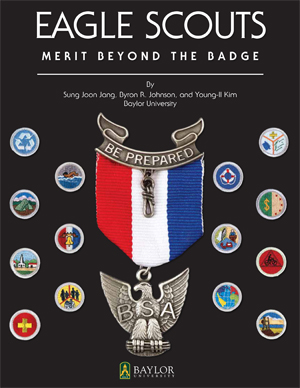Just out, after a two-year scientific study, the research report – Eagle Scouts: Merit Beyond the Badge
RESEARCH UPDATE:
|
According to the Scout Law, a Boy Scout is “Trustworthy, Loyal, Helpful, Friendly, Courteous, Kind, Obedient, Cheerful, Thrifty, Brave, Clean and Reverent.”
But does he stay that way as he grows up?
That’s a question never scientifically studied – until now. Researchers with Baylor University’s Institute for Studies of Religion received a two-year, $992,000 grant from the John Templeton Foundation for a series of studies examining the impact of Scouting in fostering positive youth development and healthy, virtuous behaviors – termed “prosocial behavior” – exhibited by Scouts.
The grant was awarded to the institute’s co-directors, Dr. Byron R. Johnson and Dr. Rodney Stark.
According to the Scouting Magazine blog: “The timing of this research coincides perfectly with the BSA’s 100th Anniversary. The results could help guide the program’s leaders through the next 100 years. And that leadership starts with Chief Scout Executive Bob Mazzuca, who said he looks forward to reading the results in a couple of years.”
The mission of the Boy Scouts of America is to prepare young people to make ethical and moral choices over their lifetimes by instilling in them the values of the Scout Oath and Law
Active in all 50 states, Boy Scouts reaches close to 3 million youth each year. Anecdotally, large numbers of adolescents involved with Boy Scouts and especially those achieving the rank of Eagle Scout, see dramatic changes in their lives including the development of character virtues such as patience, kindness, humility, service, purpose, honesty, duty, tenacity, and commitment—what might be termed as healthy, virtuous, or prosocial behaviors. But what are the factors that contribute to these young lives developing and sustaining prosocial behavior? What differentiates those adolescents who experience growth from those who do not? The present proposal seeks to expand our scientific understanding of positive youth development by examining the alleged success of Scouting, and especially with those achieving the rank of Eagle Scout. Drawing upon a number of methodological approaches and data sources, we will undertake, complete, publish, and disseminate widely a series of empirical studies documenting the long-term impact of being a Boy Scout.
Boy Scouts of America: www.scouting.org







